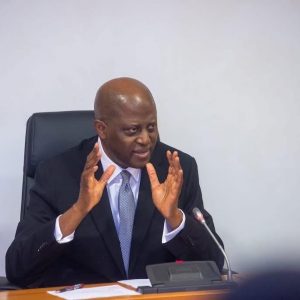When 29-year-old Nigerian journalist and lawyer, Somtochukwu “Sommie” Maduagwu fell to her death while fleeing armed robbers in Abuja late September 2025, Nigeria lost one of its brightest voices. Europe, however, lost something too: a mirror reflecting the cost of global indifference to insecurity in Africa.
Her death was not only the result of a criminal act; it was the tragic symptom of a deeper malaise. And that is a social order where security is privatized, urban spaces are unsafe, and public institutions fail to protect those who amplify truth.
To an observer in Brussels, Paris, or Berlin, this may appear as a distant national tragedy. It is not. For Europe, the lesson is clear: insecurity anywhere in Africa translates into instability, irregular migration, and economic contraction that reverberate across the Mediterranean.

Why Europe Should Care Beyond Sympathy
Europe’s relationship with Africa has too often been framed in the narrow language of aid, stabilisation, or development cooperation or international development as some prefer to frame it. Yet Somtochukwu’s death calls for a reframing. We must see it from the frame of charity to shared interest. Here are a few pointers that we as Europeans must chew over:
- Africa’s insecurity is Europe’s risk exposure.
Every act of violence that erodes trust in the state or discourages domestic investment indirectly increases Europe’s development burden and migration management costs. Safe cities in Africa mean fewer refugees, more stable trade partners, and a healthier investment climate.
- Safety is an economic opportunity.
As Nigeria and other African economies urbanise at historic pace, the demand for security infrastructure, from smart surveillance systems to emergency services, digital alert apps, forensic technologies, and trauma-care networks. These bits and pieces represent a multibillion-euro market.
- European firms are already global leaders in this space.
Belgium’s expertise in integrated urban safety systems, France’s technological capabilities in crisis management, Germany’s emergency medical solutions, and the Netherlands’ design-led security architecture; all can be strategically deployed through public-private partnerships in Africa.
- Security cooperation is climate-proof diplomacy.
As the energy transition reconfigures global interests, Europe’s moral and strategic credibility will increasingly rest on how it contributes to human security. It should not be just energy security or border control.
What Nigeria’s Tragedy Teaches About Policy and Possibility
Somtochukwu Maduagwu’s death underscores what scholars of development and governance have long argued: security is the foundation upon which all other progress rests. It reveals the human cost of weak institutions and the opportunity for transformative engagement. Nigeria’s chronic under-investment in public safety, from police reform to trauma care, mirrors structural weaknesses across much of Africa. Yet these are precisely the areas where European partnership can make tangible impact.
Europe, through mechanisms like Global Gateway, Team Europe Initiatives, and European Investment Bank (EIB) facilities, already funds energy, digital, and transport projects in Africa. A deliberate inclusion of urban safety and emergency response infrastructure within these portfolios is overdue.
This could mean:
- Supporting local governments in designing safer residential areas through European urban planning expertise.
- Co-developing smart community policing technologies, leveraging Belgian and Nordic firms’ capabilities in secure digital systems.
- Investing in health emergency networks, modelled on EU trauma-care coordination frameworks.
- Financing professional training for African private security personnel via accredited European institutions.
- Building journalist protection mechanisms, backed by EU media freedom funds and African civil society partnerships.
Each of these measures simultaneously saves lives, builds local resilience, and expands Europe’s strategic economic footprint. It also broadens the catchment areas for European expertise network propagation.
From Aid to Mutual Investment
The EU’s security and migration agenda has for too long been reactive. It emphasises investing in border control rather than human protection. But the Maduagwu tragedy argues for a shift from defensive engagement to developmental partnership.
A secure Lagos, Abuja, Johannesburg, or Nairobi is not just good for Africans. It is good for Antwerp, Brussels, Helsinki, and Berlin. Security cooperation rooted in local empowerment can yield dividends across:
- Trade and logistics, by safeguarding investments and supply chains.
- Innovation, as European security-tech firms partner with African cities to develop scalable digital safety tools.
- Diplomacy, through renewed trust and shared values of dignity, safety, and the rule of law.
If Europe truly wants to be Africa’s partner of first resort, this is where its values and its interests align.
The Moral Imperative
Somtochukwu Maduagwu’s death should never have happened. Yet if it forces both Nigeria and its international partners to redefine what security means, not just the absence of war, but the presence of safety, dignity, and opportunity, her passing will not be in vain.
Europe’s policymakers, investors, and citizens must recognise that helping Africa secure its people is not an act of generosity. It is an investment in shared stability, prosperity, and humanity. If the EU and its member states commit resources, innovation, and partnership to help African nations professionalize security, modernize urban safety infrastructure, and strengthen emergency systems, then the next Somtochukwu will not die in fear.
She will live, work, and thrive. And the world will be better for it.
Credit: www.collinsnweke.eu
Stay ahead with the latest updates!
Join The Podium Media on WhatsApp for real-time news alerts, breaking stories, and exclusive content delivered straight to your phone. Don’t miss a headline — subscribe now!
Chat with Us on WhatsApp







